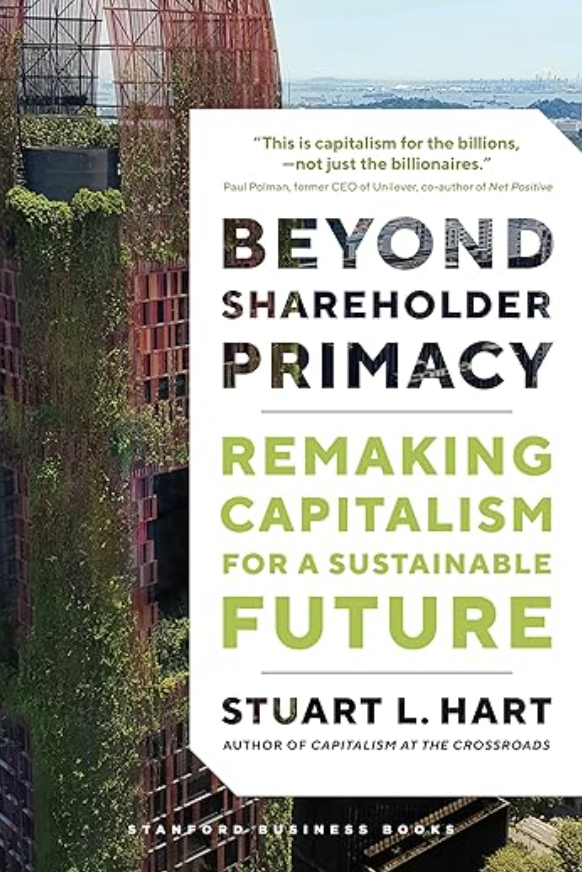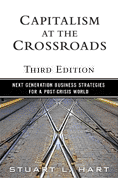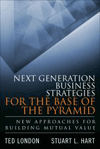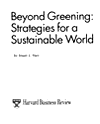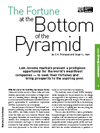Strategies for Sustainable Value

ABOUT
I'm Stuart L. Hart, a leading authority on the implications of environment and poverty for business strategy. A few years ago, I defined the concept of sustainable value; my work includes over 70 academic papers and several books.
My blog: Voice of the Planet >>
Learn more >>
BOOKS
My latest book, Beyond Shareholder Primacy: Remaking Capitalism for a Sustainable Future, published in 2024, is a call to consciousness―and action―for individuals, organizations, communities, and nations.
My best-selling book, Capitalism at the Crossroads, published in 2005, was selected by Cambridge University as one of the 50 top books on sustainability of all-time; the third edition of the book was published in 2010.
With Ted London, I'm the author of a newly released book entitled Next Generation Business Strategies for the Base of the Pyramid.
More books >>
ARTICLES
Beyond Greening: Strategies for a Sustainable World won the McKinsey Award for Best Article in the Harvard Business Review for 1997 and helped launch the movement for corporate sustainability.
With C.K. Prahalad, I wrote the pathbreaking article: The Fortune at the Bottom of the Pyramid which provided the first articulation of how business could profitably serve the needs of the four billion poor in the developing world.
The Great Leap: Driving Innovation from the Base of the Pyramid
By Stuart L. Hart and Clayton Christensen, Sloan Management Review
A Natural-Resource-Based View of the Firm
By Stuart L. Hart, Academy of Management Review
More articles >>
About
A sustainable world is one in which humans - indeed, all life forms - can flourish indefinitely. This means reversing the widening gap between rich and poor, and halting the rampant loss of natural capital and biodiversity worldwide. A sustainable enterprise, then, is one that grows and profits by moving us more rapidly in this direction.
I'm Stuart L. Hart, the Samuel C. Johnson Chair in Sustainable Global Enterprise and Professor of Management at Cornell University's Johnson School of Management.
Attaining global sustainability through this new breed of enterprise calls for transformational change in corporate vision and strategy. To address this challenge, companies must learn how to open up to the world: strategies need to take into account the entire human community of 6.6 billion, as well as the host of other species with which we share the planet.
To realize the vision of sustainable enterprise, a new set of guiding principles are needed. That's why I'm the Founder and President of Enterprise for a Sustainable World, a think tank and non-profit, dedicated to tackling the world’s most pressing social and environmental problems through a new, more inclusive form of commerce: sustainable enterprise.
The "pillars of sustainable enterprise" are built on principles that support the institutional change required for a truly sustainable world. Three are of particular importance:
- Shatter the Trade-Off
- Think Like a Disrupter, and
- Build Native Capability.
Shatter the Trade-Off
Since the time of the industrial revolution, firms have engaged in what might be described as a "take, make, waste" organizing paradigm: Natural resources have been extracted as cheap raw materials; displaced farmers and rural migrants have been exploited for their cheap labor; and local environments have been degraded into cheap waste sinks. This "take-make-waste" pattern continues to this day.
Command-and-control regulation seemed like a necessary and appropriate counter to this prevailing mindset: Corporations should "pay" for the negative consequences associated with their operations. Paradoxically, this "end-of-pipe" approach has resulted in what I call the "Great Trade-Off Illusion" — the belief that firms must sacrifice financial performance to meet social and environmental expectations.
Truth be told, there is no inherent conflict between financial and societal performance. In fact "sustainability" represents the biggest business opportunity in the history of capitalism! Realizing this opportunity means consciously seeking to overthrow the tyranny of the "trade-off" mentality.
Consider the following: In the 1970s, US manufacturers firmly believed that higher quality products meant higher costs. The entry of Japanese producers practicing a new form of "quality management," however, effectively shattered this trade-off. We now know that high quality and low cost can be mutually reinforcing.
In the 1980s, corporations still firmly believed that "it didn't pay to be green." The logic of "pollution prevention," however, shattered this trade-off. By the 1990s, it was clear that pollution prevention "paid" by reducing cost and risk, and the concept of "eco-efficiency" was born.
Today, the air is still thick with the language of "trade-off:" "You can't do business with the poor without aid;" and "clean technology is not yet economically viable without government subsidy." If history teaches us anything, it should be clear that accepting such orthodoxies is simply lazy thinking; it leads to competitive oblivion.
Smart strategists are now focusing on these "trade-offs" and finding ways to "shatter" them. As my colleague, the late C.K. Prahalad, and I would say, the fortune may well be at the "bottom of the pyramid!" Seizing the sustainability opportunity thus means learning to revel in contradiction, reconcile opposites, and embrace paradox.
Think Like a Disrupter
As we enter the new century, the “dark satanic mills” of the Industrial Revolution are giving way to a new generation of technologies that promise to change dramatically the societal, economic, and environmental landscapes. The information economy powered by the microchip has already begun to revolutionize society by democratizing access to information, empowering workers and communities, and increasing productivity.
Incremental “eco-efficiency” improvements to current technologies will no longer be sufficient: In the coming years, bioscience; nanotechnology; new materials; wireless IT; renewable energy; distributed generation; and point-of-use water will dramatically reduce the size of the human footprint on the planet, and make obsolete many of today’s energy- and material-intensive incumbents.
Perhaps even more important, given their small scale and distributed nature, such “sustainable” technologies hold the potential to: creatively destroy existing hierarchies; bypass corrupt governments and regimes; and usher in an entirely new age of capitalism that brings widely distributed benefits to the entire human community.
Given that clean technologies are almost always “disruptive” to large incumbent businesses, seizing the sustainability opportunity means learning to think — and act — like a disrupter. It means launching small-scale experiments and growing them from the bottom-up, rather than continued dependence on large-scale solutions imposed from the top-down.
As my colleague Clay Christensen and I suggest, the base of the pyramid may turn out to be the ideal place to incubate the “clean” technologies of tomorrow. And taking the “great leap” to the base of the pyramid means turning the time tested business models and routines designed to serve established markets on their heads.
Build Native Capability
Today’s corporations are being challenged to rethink global strategies in which “one-size-fits-all” products are made for the global market using world-scale production facilities and supply chains. Even so-called “locally responsive” strategies are often little more than pre-existing solutions tailored to “fit” local markets.
Technologies are transferred from corporate labs and applied in unfamiliar cultural and environmental settings; unmet needs in new markets are identified through demographic data. The result is still-born products and inappropriate business models that fail to effectively address real needs.
To realize the sustainability opportunity, companies must develop a new mindset that enables them to develop fully contextualized solutions to real problems in ways that respect local culture and natural diversity. This means engaging in “deep dialogue” with local communities to co-create businesses that are truly “embedded” in the local context.
Building this new capability means suspending traditional assumptions regarding business development. It requires putting down the corporate “hammer,” and actually experiencing life in poor and underserved communities in a spirit of humility and mutual learning. It requires forging relationships built on trust, understanding, and respect — from which new possibilities for locally embedded businesses can emerge that create value for all partners involved.
As my colleague Erik Simanis and I suggest, companies must come to view the poor and underserved as partners and colleagues, rather than clients and consumers. This mindset shift requires the development of a new, “native capability” to complement competencies in global efficiency, local responsiveness, and learning-transfer that most corporations already possess.
Is your company ready to begin the journey? Contact us>>
Additional Biographical Highlights
Before joining Cornell in 2003, I was the Hans Zulliger Distinguished Professor of Sustainable Enterprise and Professor of Strategic Management at the University of North Carolina's Kenan-Flagler Business School, where I founded the Center for Sustainable Enterprise and the Base of the Pyramid Learning Laboratory.
Previously, I taught corporate strategy at the University of Michigan's Ross School of Business and was the founding director of the Corporate Environmental Management Program (now the Erb Institute's Dual Master's Program).
I'm considered by many as one of the world’s top authorities on the implications of environment and poverty for business strategy. I've published over 70 papers and authored or edited seven books. My article Beyond Greening: Strategies for a Sustainable World won the McKinsey Award for Best Article in the Harvard Business Review for 1997 and helped launch the movement for corporate sustainability.
I've been fortunate to receive numerous honors and awards for my work in the area of sustainable enterprise. In addition to the 1997 McKinsey Award, my 2001 paper Do Corporate Global Environmental Standards Create or Destroy Market Value? (with G. Dowell and B. Yeung) won the Moskowitz Prize for outstanding research in the field of socially responsible investing.
In addition, I was recognized as a “Faculty Pioneer” by the World Resources Institute in 1999 for my work in integrating environmental and social issues into the management education curriculum.
In 2002, I won the Gerald R. Barrett Award as the "faculty member who contributed the most to the MBA Program at UNC through his scholarship, teaching, and service."
I've served as consultant, advisor, or management educator for dozens of corporations and organizations including Dupont, S. C. Johnson, General Electric, Baxter Healthcare, Wal Mart, the World Economic Forum, and the Clinton Global Initiative. I'm also an internationally recognized speaker and I've delivered hundreds of keynote addresses on the topic of sustainable business around the world.
I earned my Bachelor’s degree from the University of Rochester (General Science), Master’s degree from Yale University’s School of Forestry and Environmental Studies (Environmental Management), and Ph.D. from the University of Michigan (Planning and Strategy).
Downloads: My CV, bio-sketch, high-res photo >>
(C) 2011 Stuart L. Hart. All Rights Reserved
Contact | Newsletter | Privacy
